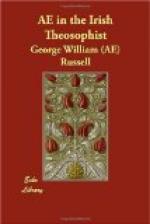love, and all that great beauty thrilled through it
and quickened it. But from this vision which
the spirit had, it passed to climb to still greater
heights—it was spiritual, it might attain
divinity. The change from the original transcendental
state of vision to that other state of being, of all-pervading
consciousness, could only be accomplished by what
is known as the descent into matter where spirit identifies
itself with every form of life, and assimilates their
essences. This cyclic pilgrimage it undertook,
foreseeing pain, but “preferring free will to
passive slavery, intellectual, self-conscious pain,
and even torture, ‘while myriad time shall flow,’
to inane, imbecile, instinctual beatitude,” foreseeing
pain, but knowing that out of it all would come a
nobler state of life, a divinity capable of rule,
a power to assist in the general evolution of nature.
It is true in the experience of many that going deep
within themselves, an elemental consciousness whispers
comfort; it says all will be well with us; it is
our primal will which so orders. And so we justify
the pain and hearts that break; and that old appeal
and fierce revolt we make dies out in the inner light
which shines from “the Goal, the Comforter, the
Lord, the Witness, the resting-place, the Asylum,
the Friend.” We can then once more go
forth with the old, heroic, Titan will for mastery,
seeking not to escape, but rather to meet, endure,
and assimilate sorrow and joy alike; for so we can
permeate all life—life which is in its
essence one. This is the true centre on which
all endurance must rest; this is the comfort the
soul may take to itself; and beyond and after this
we may say we struggle in a chaos indeed, but in a
chaos whose very disorder is the result of law.
That law is justice that cannot err. Out of confidence
in this justice may spring up immortal hopes; our
motives, our faith shall save us. We may dare
more, give ourselves away more completely, for is
not the root of this law declared to be beauty, harmony,
compassion. We may trust that our acts shall
have full fruition, and remain careless of the manner,
nor seek for such results. We may look upon
it if we will as the sweetest of the sweetest, the
tenderest of the tenderest; and this is true, though
still it is master of the fiery pain. Above
all it is the law of our own being; it is at one with
our ancestral self. In all this lies, I think,
such consolation as we may take and offer for pain.
Those who comprehend, in their resignation, shall
become one with themselves; and out of this resignation
shall arise will to go forth and fulfil our lofty
destiny.
—May 15, 1894




